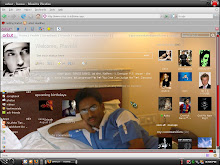What is an E-book?
Posted by
Praveen on Thursday, May 8, 2008
|
Share this post:
|
0 Comments
First letter...An e-book (for electronic book: also ebook: also ecobook) is the digital media equivalent of a conventional printed book. Such documents are usually read on personal computers, or on dedicated hardware devices known as e-book readers or e-book devices.
Advantages:
Text can be searched automatically, and cross-referenced using hyperlinks. This makes e-books an excellent choice of format for works that benefit from search and cross-reference capabilities, such as dictionaries, reference works, and certain kinds of textbooks.
Less physical space is required to store e-books. Hundreds (or thousands) may be carried together on one device. Approximately 500 average e-books can be stored on one CD (equivalent to several shelves of print books). Because they take up little space, e-books can be offered indefinitely, with no 'out of print' date, allowing authors to continue to earn royalties indefinitely (copyright law permitting) and allowing readers to find older works.
Readers who have difficulty reading print books can benefit from the adjustment of text size and font face. Text-to-speech software can be used to automatically convert e-books to audio books. In addition, some e-books devices allow reading in low light or even total darkness, with a back-lit device.
An ebook may be more comfortable for some to hold because it does not need to be held open like a paperback. It can also be set down and read hands-free.
It costs little to reproduce an e-book. Copies can be made instantly and in as great a quantity as desired. This makes it easy to retain backups and difficult to eliminate works once they have been distributed. From the publisher's point of view, the ease of distributing e-texts means that they can be used to stimulate higher sales of printed copies of books.[1]
With Internet access becoming ubiquitous in industrial nations, the ease of distributing e-books is a considerable advantage. E-books cost little to transfer, and such an operation occurs quickly. Readers can begin reading as soon as the download completes, or sooner, depending on the e-book formats' capabilities, without the need to visit a bookstore.
Although they require electricity to be read, the production of e-books does not consume the paper, ink, and other resources that are used to produce print books.
Books in electronic form are usually cheaper than same books on paper, and some are free.
An electronic book can be downloaded in seconds or minutes, while sending a paper book takes days or weeks.
Some books exist only in electronic form.
Ebooks can in theory be updated wiki-style, thus keeping a record of changes, as well as having the most up to date version.
Less physical space is required to store e-books. Hundreds (or thousands) may be carried together on one device. Approximately 500 average e-books can be stored on one CD (equivalent to several shelves of print books). Because they take up little space, e-books can be offered indefinitely, with no 'out of print' date, allowing authors to continue to earn royalties indefinitely (copyright law permitting) and allowing readers to find older works.
Readers who have difficulty reading print books can benefit from the adjustment of text size and font face. Text-to-speech software can be used to automatically convert e-books to audio books. In addition, some e-books devices allow reading in low light or even total darkness, with a back-lit device.
An ebook may be more comfortable for some to hold because it does not need to be held open like a paperback. It can also be set down and read hands-free.
It costs little to reproduce an e-book. Copies can be made instantly and in as great a quantity as desired. This makes it easy to retain backups and difficult to eliminate works once they have been distributed. From the publisher's point of view, the ease of distributing e-texts means that they can be used to stimulate higher sales of printed copies of books.[1]
With Internet access becoming ubiquitous in industrial nations, the ease of distributing e-books is a considerable advantage. E-books cost little to transfer, and such an operation occurs quickly. Readers can begin reading as soon as the download completes, or sooner, depending on the e-book formats' capabilities, without the need to visit a bookstore.
Although they require electricity to be read, the production of e-books does not consume the paper, ink, and other resources that are used to produce print books.
Books in electronic form are usually cheaper than same books on paper, and some are free.
An electronic book can be downloaded in seconds or minutes, while sending a paper book takes days or weeks.
Some books exist only in electronic form.
Ebooks can in theory be updated wiki-style, thus keeping a record of changes, as well as having the most up to date version.
 About Me
About Me Contact Me
Contact Me




